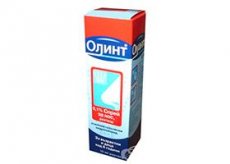Medical expert of the article
New publications
Preparations
Olint
Last reviewed: 03.07.2025

All iLive content is medically reviewed or fact checked to ensure as much factual accuracy as possible.
We have strict sourcing guidelines and only link to reputable media sites, academic research institutions and, whenever possible, medically peer reviewed studies. Note that the numbers in parentheses ([1], [2], etc.) are clickable links to these studies.
If you feel that any of our content is inaccurate, out-of-date, or otherwise questionable, please select it and press Ctrl + Enter.

Olint is a local vasoconstrictor drug used in the treatment of ENT diseases. It belongs to the category of α-adrenomimetics.
Indications Olinta
Shown in such cases:
- treatment of hay fever, sinusitis, acute infectious rhinitis and allergic rhinitis;
- preparation of the nasal cavity for diagnostic procedures;
- inflammation of the middle ear (as an additional drug – to remove swelling in the nasopharynx).
 [ 1 ]
[ 1 ]
Release form
Available in drops, nasal gel and spray.
The gel is 0.1% and comes in a 5 g tube. The package contains 1 tube of gel.
The drops are available in bottles of 10, 15, 20 or 30 ml (0.1% and 0.05%), 1 bottle inside the package.
The spray is available in 10 or 20 ml bottles (0.1% and 0.05%), 1 bottle per pack.
 [ 2 ]
[ 2 ]
Pharmacodynamics
As a result of applying the product to the mucous membranes, the vessels constrict, which helps to reduce swelling and local hyperemia. When treating runny noses, the drug helps to facilitate breathing through the nose.
Dosing and administration
The medicine in all its forms is administered intranasally.
The gel can be applied no more than 4 times a day, and the last application is recommended to be done at least 15 minutes before bedtime.
For children aged 6-12 years, it is necessary to prescribe a spray, as well as drops with a concentration of 0.05%. Teenagers from 12 years old can use a spray and drops, the concentration of which is 0.1%.
It is necessary to instill drops 2-3 times into each nostril.
When using the spray, it is necessary to spray 1 spray into each nostril.
For children under 6 years of age, 1-2 drops are instilled into each nostril. The medicine with a concentration of 0.05% is used.
Use Olinta during pregnancy
Olint should not be used during pregnancy.
Contraindications
Among the main contraindications:
- the presence of intolerance to xylometazoline and other additional elements of the drug;
- severe form of atherosclerosis;
- high blood pressure;
- atrophic rhinitis;
- history of brain surgery;
- hyperthyroidism, glaucoma and tachycardia;
- Children should not be prescribed gel or solution with a concentration of 0.1%.
It should be prescribed with caution in the following cases:
- diabetes mellitus, angina pectoris, prostate adenoma;
- lactation period.
Drops with a concentration of 0.05% for children under 2 years of age are prescribed only in the absence of an alternative.
Side effects Olinta
The following side effects may occur as a result of using the medicine:
- dryness or irritation of the nasal mucosa;
- local burning;
- development of paresthesia and paradoxical hypersecretion;
- swelling of the nasal mucosa, sneezing;
- tachycardia and arrhythmia, as well as increased blood pressure;
- visual disturbances, headaches, depression;
- increased excitability and vomiting.
 [ 3 ]
[ 3 ]
Shelf life
Olint in the form of a gel can be used for a period of 2 years, and spray and drops - for a period of 3 years from the date of release of the drug.
Attention!
To simplify the perception of information, this instruction for use of the drug "Olint" translated and presented in a special form on the basis of the official instructions for medical use of the drug. Before use read the annotation that came directly to medicines.
Description provided for informational purposes and is not a guide to self-healing. The need for this drug, the purpose of the treatment regimen, methods and dose of the drug is determined solely by the attending physician. Self-medication is dangerous for your health.

